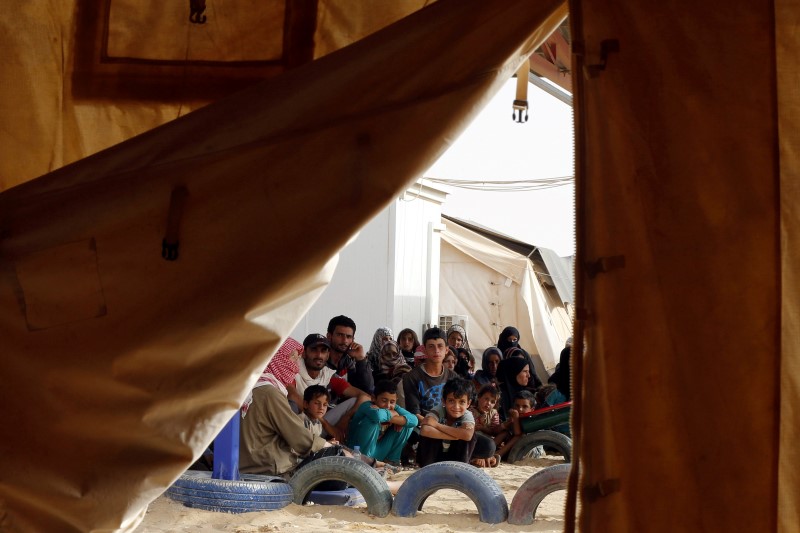By Suleiman Al-Khalidi
AMMAN (Reuters) - Thousands of Syrian refugees stranded on Jordan's northeastern border with Syria are running out of food after a militant suicide attack prompted the army to shut the area, international relief workers and refugees said on Monday.
Jordan, a staunch U.S. ally, declared the area a closed military zone after a suicide bomber, believed to be an Islamic State militant, drove a vehicle last Tuesday from the Syrian side and rammed it into a military base close to Rukban camp, killing seven border guards.
Aid workers said convoys of food which normally go to the camp were being held up for a sixth day in Ruwaished, the closest town to Rukban camp, which is far from any inhabitable place. Only water trucks were being allowed through.
"Access continues to be denied and we are concerned because these trapped people have basic needs," said Hala Shamlawi, spokesperson for the International Committee for the Red Cross (ICRC).
Relief workers said the few supplies coming into the area were from smuggler rings inside Syria.
"We know the food rations will run out soon, probably in a few days' time ... This is a matter of concern," said Dina El Kassaby, regional spokesperson of World Food Programme (WFP).
The authorities gave no explanation for blocking aid that affects between 60,000 to 70,000 refugees, mostly women and children, who have been stranded for months in a no-man's land at the only crossing where Jordan now receives refugees.
DESERT
Since Russia expanded its air strikes against Islamic State-held areas in central and eastern Syria, the number of refugees trekking south across the desert to the Jordanian border has risen sharply, according to U.N. aid workers.
But Jordan, which has already accepted more than 600,000 U.N.-registered Syrian refugees, fears Islamic State militants may have infiltrated the ranks of those arriving at the border.
Earlier waves of Syrian refugees had a much easier time entering Jordan but the kingdom sealed border crossings near population centres in 2013 in an attempt to stem the flow.
Officials chose the sparsely populated desert area where the borders of Syria, Jordan and Iraq meet in order to discourage refugees from entering the kingdom, relief workers say.
Rights groups such as Amnesty International have urged Jordan not to take a tough security response.
"A total closure of the border and denial of humanitarian aid to the area would inevitably lead to extreme hardship among those unable to find refuge and put their lives at risk," said Sherif Elsayed-Ali of Amnesty International.

Foreign Minister Nasser Joudeh told Western envoys after the attack that Jordan's security outweighed humanitarian concerns.